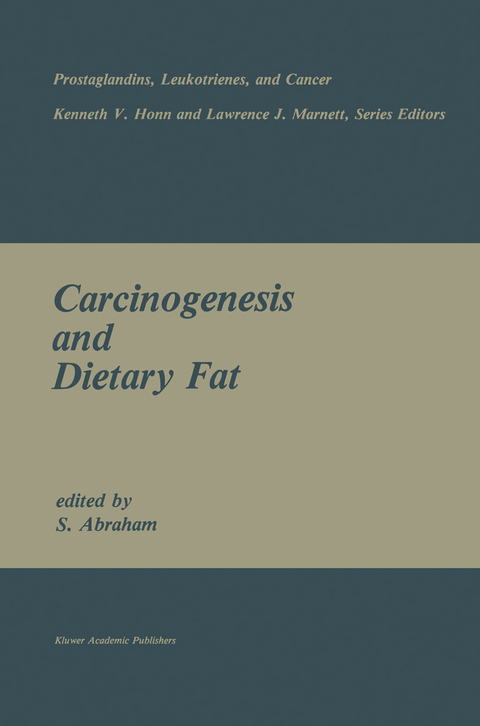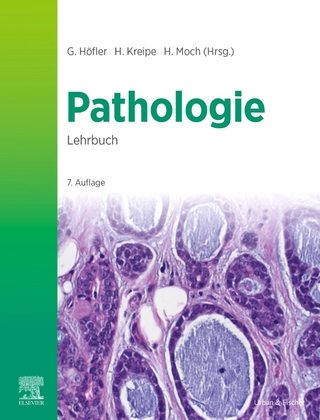
Carcinogenesis and Dietary Fat
Springer-Verlag New York Inc.
978-1-4612-8878-7 (ISBN)
This occurs in response to numerous stimuli that act at the cell surface. Dr. Bengt Samuelsson's extensive study ofthe metabolism of prostaglandins indicate that they are rapidly inactivated on a single pass through pulmonary circulation. Thus, they cannot act as circulating hormones and appear to be made on demand in the vicinity oftarget tissues leading to the concept that prostaglandins are local rrormones or autocoids. Altered production, qualitative and/or quantitative, of prostaglandins and leukotrienes has been implicated in the development of a number of disease states (e. g.
Dietary Formulation and Feeding Regimens.- 1. Dietary Design in Fat and Cancer Research.- 2. Nutritional Methodology in Dietary Fat and Cancer Research.- Effects of Dietary Fat on Eicosanoid Production in Normal Tissues.- 3. Effects of Dietary Fat on Eicosanoid Production in Normal Tissues.- 4. Eicosanoids, Their Dietary Precursors and Drugs that Modify their Production or Actions: Implications in Cancer.- Mammary Tumors.- 5. Differential Effects of Specific Types of Dietary Lipid on Mammary Tumor Development.- 6. Dietary Fatty Acids and Mammary Tumorigenesis.- 7. Enhancement of Mammary Tumorigenesis by Dietary Fat: An Endocrine and/or Calorie Mechanism?.- Pancreatic Tumors.- 8. Role of Dietary Fat in Experimental Pancreatic Carcinogenesis.- Colon Tumors.- 9. Etiology of Colon Cancer.- 10. Autoxidation Products and Intestinal Carcinogenesis.- Metastasis and Eicosanoids.- 11. Prostaglandins and Tumor Metastasis.- 12. Tumor Metastasis: The Possible Role of Eicosanoids.- 13. PGE2 Mediated Inactivation of Potentially Tumorcidal Effector Cells of the Host During Tumor Development: Relevance to Metastasis and Immunotherapy.- 14. Regulation of Tumor Cell Adhesion and Motility by Arachidonic Acid Metabolism.- Human Tumors.- 15. Polyunsaturated Fatty Acids and Human Cancer.- Tumor Cell Heterogeneity.- 16. Tumor Tissue Dynamics and Diet in Breast Cancer.- 17. Factors Involved in the Development and Maintenance of Tumor Heterogeneity.- Immunological Aspects.- 18. Polyunsaturated Fat-induced Immune Suppression: Involvement of Prostaglandin — Producing Suppressor Cells.- 19. Tumor-Mediated Immunosubversion: Role of Dietary Essential Fatty Acids.- 20. Dietary Fat, Lipids, Immunology in Carcinogenesis.- 21. Mechanisms of Dietary Fat Involvement in Tumorigenesis: Role of Fatty Acidsand Eicosanoids in Macrophage Function.- Cell Separation and Identification.- 22. Cell Separation and Identification.- Cell Culture.- 23. Differential Responsiveness of Normal and Neoplastic Mammary Epithelium to Unsaturated vs. Saturated Fatty Acids.- 24. The Role of Fatty Acids in Murine and Human Mammary Carcinogenesis: An In Vitro Approach.- 25. Cell Culture Strategies for Analysis of Dietary Variables in Cancer.
| Reihe/Serie | Prostaglandins, Leukotrienes, and Cancer ; 6 |
|---|---|
| Zusatzinfo | XX, 492 p. |
| Verlagsort | New York, NY |
| Sprache | englisch |
| Maße | 155 x 235 mm |
| Themenwelt | Medizin / Pharmazie ► Medizinische Fachgebiete ► Onkologie |
| Studium ► 2. Studienabschnitt (Klinik) ► Pathologie | |
| Naturwissenschaften ► Chemie | |
| ISBN-10 | 1-4612-8878-9 / 1461288789 |
| ISBN-13 | 978-1-4612-8878-7 / 9781461288787 |
| Zustand | Neuware |
| Haben Sie eine Frage zum Produkt? |
aus dem Bereich


